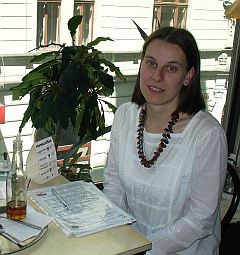Lucie Kettnerová • foto: Bečov State castle and Chateau, archiv H. Havlůjová • 17 June 2013
Teachers of the future have their own faculty castle. History students take some lessons at Bečov Castle
At the end of May the CU Faculty of Pedagogy signed a cooperation agreement with the Czech National Heritage Institute, allowing students of history and, eventually, other subjects to spend part of their studies in the authentic environment of Bečov Castle. Cooperation between the two institutions is, however, nothing new, and stretches back to 2008.
The first contact between representatives of the Department of History and History Didactics and the National Heritage Institute was forged five years ago in Český Krumlov, at a seminar focusing on didactic programmes on UNESCO sites. “We were presenting a project, realised through the European Social Fund, concerning education in relation to the cultural and historical heritage of Europe,” said Dr. Hana Havlůjová, Ph.D., specialist assistant to the Department of History and History Didactics.
A number of national heritage sites, including Telč and Bečov, were also giving presentations in Český Krumlov on their activities promoting the development of educational programmes. “When I was translating the presentations for one of my colleagues from Britain, I realised that, for some of the projects, I couldn’t think of a parallel in other countries; these really are unique proposals,” said Dr. Havlůjová.

Dr. Hana Havlůjová, Ph.D., specialist assistant at the Department of History and History Didactics of the CU Faculty of Pedagogy
Based on this seminar, representatives of the Department contacted Bečov State Castle and Chateau, as well as Plasy Monastery, to prepare a selection seminar. This was held in 2009 and allowed students to suggest programmes for school pupils and students for both heritage sites. Students also visited one site or the other to get a better idea of what kind of projects would and wouldn’t be workable.
Parallel to these activities, Dr. Havlůjová also got a group of students to whom she was teaching history at the time involved. She used these students to ‘test’ how a national heritage site could inspire people in their age group and which activities, as drawn up by future teachers, they could manage. The secondary-school students, including one blind girl, asked for more exhibits that visitors could touch at Bečov Castle.
As state-administered heritage sites don’t have the funds for this type of exhibit, the students applied for a grant, announced by the Vodafone Foundation, and, in cooperation with inmates from Horní Slavkov Prison, created a replica of the reliquary of St. Maurus. This replica is mobile, meaning that it can be carried to different parts of the castle and, in winter, taken to talks at schools and old people’s homes. “We tried to make a presentation on the reliquary to give listeners a better idea of the meaning of terms such as reliquary, saint or remains. As part of the project the students also created a haptic map of Europe, showing places where reliquaries are found,” continued Dr. Havlůjová.
In 2012 the Pedagogical Faculties of Charles University and Masaryk University joined forces with the National Heritage Institute as part of a Ministry of Culture project entitled The educational Role of the National heritage Institute: Education as a Key Tool in the Improved Care of the Cultural Heritage of the Czech Republic, which will last until 2015 and whose aim it is open heritage sites up to a variety of educational activities aimed at all generations.
“As we had already tried selection and didactic seminars, we wanted to think of heritage sites in a global sense, as witnesses to the past that we want to understand, so we took students, as part of their introductory history courses, to the real-world environment of Bečov, where there is not only the castle, but also a historic town with a constantly renewing botanic garden, meaning we also had something to offer students who were also studying biology,” explained Dr. Hana Havlůjová.
The outcome of this was a four-day interactive excursion that gave students the opportunity try many things out for themselves and see them in context.
“We are currently evaluating the fulfilment of the goal of the seminar and benefit to students. We would like to continue into next year and we’ll see whether the concept is transferable to other projects realised as part of university education.”
The aforementioned cooperation agreement between the National Heritage Institute and the CU Faculty of Pedagogy was signed on 29 May and gives Bečov State Castle and Chateau the status of Faculty Heritage Site. “I believe that the cooperation that we have initiated will be of interest to not only historians, but also special pedagogues or other parts of Charles University for pedagogical research,” said Dr. Havlůjová in evaluating the new contract.
